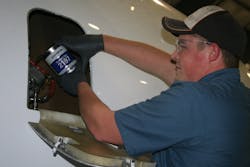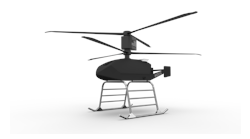Advancements in Turbine Engine Oils
Operators of the commercial airline industry’s newest generation turbine engines are said to be placing greater emphasis on engine oil life as oil temperatures are increasing and oil consumption is decreasing. Turbine engines today primarily use two types of engine oils; Standard Performance Capable (SPC) and High Performance Capable (HPC) oils.
To discuss turbine engine oils, we contacted Paul Fridman, aviation marketing manager with Eastman Aviation Solutions, and asked a few questions regarding oil chemistry and the effects on operation and maintenance. Eastman acquired the aviation turbo oils business from BP in June 2014.
AMT: Describe some of the typical turbine engine oils and their chemistry.
PF: Standard Performance Capable (SPC) oils are used across many engines and accessories which don't require the high thermal properties that HPC oils offer. SPC oil has been used by airlines for many years. Many likely recall Exxon Turbo Oil 2380. This product line has since gone through two acquisitions to BP and then to Eastman.
High Performance Capable (HPC) oils are 5 cSt (Centistokes) oils that are used in both turbine engines and accessory equipment such as IDG’s. HPC oils offer an enhanced performance benefit through higher thermal stability These HPC oils have been designed to handle the requirements of newer more fuel-efficient engines that typically have higher operating temperatures.
APU oils are typically slightly thinner oils (3 cSt) so they offer better low temperature properties to support engine start/stops in colder environments because of the ability to function in cold temperatures which is essential for Extended-range Twin-engine Operations (ETOPS) when a cold start is required by the APU.
Additionally, for the helicopter market there are 5 cSt oils offering enhanced load-carrying features supporting use in combined engine/gearbox lubrication systems.
AMT: What are some key indicators of a healthy oil system?
PF: When a commercial aircraft engine consumes sufficient HPC oil through normal operation and subsequent top-off, regular oil testing is generally not necessary. Oil analysis is seldom employed in commercial airline operations. However, operators of turbine engine helicopter, business and general aviation aircraft will still perform regular testing as the original charge of oil may well be in the oil system for much longer periods without top-off. Modern engines also have on-board systems to detect metallic wear chips in the oil system as well as sensitive accelerometers to detect vibration due to bearing deterioration that will alert operators to an issue faster than any practical oil sampling interval.
Considering oil health over an extended time period, its quality and performance features are generally preserved through normal top-off frequency (typically 0.1 quarts per operating hour). This situation is different in lower utilization segments such as helicopters and general aviation where the lubrication system has the opportunity to accumulate moisture during periods of inactivity as well as lesser opportunity for refreshing of the oil charge through top-off replenishment. Ultimately, this lack of aircraft utilization can accelerate the deterioration of the turbine oil.
AMT: What benefits are operators likely to see when transitioning to the new HPC technology lubricants?
PF: Various engine models require specific lubrication system component inspections and cleaning tasks often mandated by OEMs through service bulletins due to deposits or deterioration of oil. In many cases, the time between cleaning or inspections can be extended or their associated work scope reduced when the operator is using an HPC oil. The deposit-reducing tendency of HPC oils provide for a cleaner operating engine and associated lower concerns over blockage of critical oil supply and scavenge tubes.
Eastman developed a Value Proven Tool that quantifies the potential maintenance savings an operator will enjoy for these affected engines should they utilize an HPC class oil such as ETO 2197.
AMT: How does oil type affect inspection and/or maintenance activity?
PF: HPC oil performance has allowed OEMs to revise traditional maintenance and inspection intervals in some cases. It also helps reduce time between maintenance intervals. Switching from standard to high performance oil can have a very beneficial effect on internal component wear. You can model examples of the positive effects of using High Performance Capable oil on the Eastman Value Proven Tool.
AMT: Has there been any studies linking operating hours to engine cleanliness?
PF: Eastman has completed a number of studies comparing component health using both Standard Performance Capable and High Performance Capable oils. These critical components include oil vent tubes, bearings, and oil supply tubes. Significant benefits are seen in using HPC oils versus SPC oils indicated by lower levels of carbon deposits and a reduction in tube blockage over extended time periods. With respect to bearing areas, cleanliness was also noted to be substantially improved with HPC class oils. All these benefits can be attributed directly to the higher thermal stability offered by HPC oils.
More information can be found at http://www.eastman.com/Brands/EAS/Pages/Home.aspx including the online resource Value Proven Tool. Paul Fridman can be reached at [email protected].



